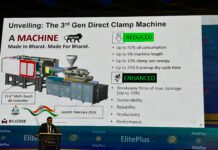ABB is a pioneering global corporation at the forefront of power automation technologies, working closely with utility, industry, food, transport and infrastructure enterprises across 100 countries. ABB is present in India for nearly seven decades now, having begun operations in 1949 although it wasn’t the giant that it is now. The food processing industry is one of the main areas of focus for ABB in India and this was evident during the recent PackEx India 2017 exhibition at Pragati Maidan in New Delhi, where ABB India was present in strength. Packaging South Asia met Rajkumar Khanapure, country leader – food & beverages, India and Vikram Kanth, marketing and communication head, industrial automation, ABB India, for a discussion on the company’s exhibits at the event and more.
ABB offers an extensive range of products for the F&B and packaging industries, such as induction motors, low voltage lights, motion controllers, programmable logic controllers, mounted bearings, as well as gear boxes and power transmission components like coupling as well as belts. The applications cover agitators, mixers, conveyor systems, bakery instruments, rice mills and food grain products. In the food industry, if it is a process like grain handling, which has a dry environment, ABB uses a special motor, which is ideal for controlling flammability. The food dust which is flammable can cause fire outbreaks arising from static electricity as well as surface temperature of the motor. ABB’s LV (low voltage) flame-proof motor, which was displayed at the event, is perfect for such applications.
Kanth said, “We have many options of motors and generators on offer that have different applications. Customers rely on us for know-how about design costs and solutions, which are aimed at energy efficiency. These are critical factors for the overall safety of humans. So, when you manufacture in a hygienic environment, you need to follow certain rules especially because the motors in this environment are all built according to hygienic parameters. It means you can’t afford to litter the grease all around while lubricating the machine, as the oil must not go into the food and contaminate it.”
Kanth added, “ABB also has instrumentation solutions which will help food processors in cleaning and measuring operations if the environment is contaminated. Then there are sensors to measure the temperature and humidity because everything here is a chemical reaction. So you need the right measurement and then you have to read the measurement in real time because everything is happening so fast. Typically, our solution helps you to lower wastage and also helps you to manufacture efficiently since packaging and examining happen in a batch.”
Kanth spoke about ABB’s manufacturing operations solutions which integrate the entire manufacturing process where there is minimal use of energy as well as optimal use of uptime. Energy savings involve saving of power, regeneration of power, channeling waste heat and utilizing it productively in case the user has a captive power plant. He then spoke about Jacob’s safety system, which has a built-in logic that prevents anybody from just walking into a particular space if a robot is in operation there. Also in case of a malfunction, the whole process collapses so that nobody can enter the arena. All this is aimed at increasing safety for humans, he explained.
Summing up, Kanth said, “We believe that the assembling sector is now quite mature and is ready to move into the next level of automation and energy efficiency solutions. It has worked very well for global customers like Nestle and Tetra Pak, who are our customers. There are also many Indian FMCG players including one major biscuit manufacturer who uses our smart packing solution that further makes their plants more optimal in terms of lacquer usage and energy usage.” When asked about the SME and startup segments and how well they’re able to absorb such technology, Kanth said that it all depends on the scale and complexity of operations since automation will only benefit large-scale operations.











